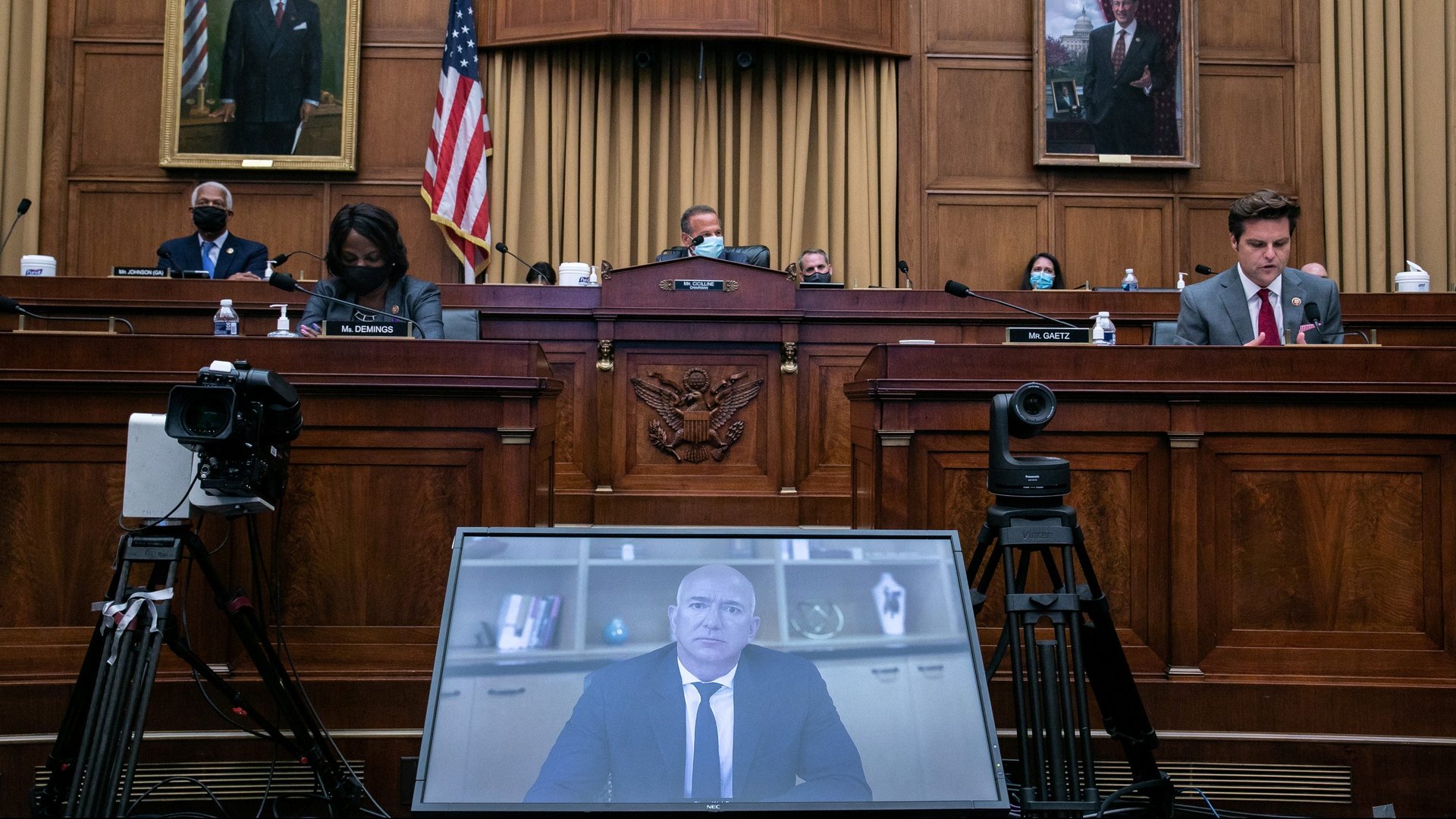Five actually smart questions from big tech’s antitrust hearing
In a hearing before the US House Judiciary Antitrust Subcommittee today, the CEOs of Apple, Facebook, Amazon, and Google fielded questions about anti-competitive practices at their companies. For close to six hours, Congressional representatives pelted Tim Cook, Mark Zuckerberg, Jeff Bezos, and Sundar Pichai with queries on everything from data privacy to online ad exchanges.


In a hearing before the US House Judiciary Antitrust Subcommittee today, the CEOs of Apple, Facebook, Amazon, and Google fielded questions about anti-competitive practices at their companies. For close to six hours, Congressional representatives pelted Tim Cook, Mark Zuckerberg, Jeff Bezos, and Sundar Pichai with queries on everything from data privacy to online ad exchanges.
Even for the most sophisticated group of askers, this would be a lot of ground to cover: The four tech companies have different business models, and different practices inviting the scrutiny of Congress. Past hearings—in particular Zuckerberg’s 2018 appearance before Congress—didn’t inspire much confidence when it comes to politicians’ grasp of the businesses they’re interrogating.
Wednesday, too, had some doozies, like when Rep. Greg Steube asked Pichai why his campaign emails were hitting his constituents’ (and dad’s) spam folders. But on the whole, the hearing was a pleasant surprise: Many of the questions were nuanced and thoughtful. Here are five of the most pointed questions posed to the world’s most powerful CEOs:
Rep. Mary Scanlon, D-PA
Scanlon took a traditional—but effective—line of attack against monopolies: She dredged up an example of anti-competitive practices driving up prices for consumers. To Jeff Bezos, Scanlon cited the example of Diapers.com: “In an email that I reviewed,” she said, “one of your top executives proposed to you an ‘aggressive plan to win’ against Diapers.com, a plan that sought to undercut their business by temporarily slashing Amazon prices.”
After acquiring the company, though, Amazon raised its diaper prices again. “You said that Amazon focuses on customers,” Scanlon followed up. “So how would customers, especially single moms, new families, how would they benefit when the prices were driven up by the fact that you eliminated your main competitor?”
Rep. Kelly Armstrong, R-ND
Armstrong cautioned against regulating with too blunt an instrument, arguing that laws can counterintuitively help monopolies grow. When questioning Pichai, he walked through the ways Europe’s 2018 GDPR privacy law allowed Google to gain ground against its competitors in digital advertising: By restricting other platforms’ ability to work with Google’s data, it could actually make them less competitive.
“Usually in our quest to regulate companies we end up hurting small companies more,” said Armstrong. “The consequences of GDPR have been to further entrench large established actors like Google, leading to regulatory capture that exacerbates competition concerns.”
Rep. Jerry Nadler, D-NY
Nadler, the Judiciary committee chairman, used a series of internal emails to probe Zuckerberg on Facebook’s acquisition of Instagram. After asking what Zuckerberg meant when he wrote that “Instagram can meaningfully hurt us without becoming a huge business” and that Facebook’s purchase of Instagram was meant to neutralize a competitor and incorporate its features, Nadler asked:
“Mergers and acquisitions that buy off potential competitive threats violate the antitrust law. In your own words, you purchased Instagram to neutralize a competitive threat. If this was an illegal merger at the time of the transaction, why shouldn’t Instagram now be broken off into a separate company?”
Zuckerberg answered, simply, that the deal had been approved in 2012 by regulators looking at the same documents the committee had.
Rep. Ken Buck, R-CO
Points for cross-disciplinary thinking: Buck asked all four CEOs about the role of slave labor in the production of their goods or those sold on their platforms. “I’m concerned that given Amazon’s allowance of counterfeit goods on its marketplace,” he said, “especially counterfeit goods from China, that Amazon’s marketplace may be knowingly or unknowingly furthering China’s use of forced and slave labor conditions.”
His question, though, was more of a request: “Will you certify here today that your company does not use and will never use slave labor to manufacture your products or allow products to be sold on your platform that are manufactured using slave labor?” (All answered yes.)
Rep. Pramila Jayapal, D-WA
Representing Amazon’s home district in Washington, Jayapal was clearly in her comfort zone while questioning both Bezos and Zuckerberg about anti-competitive practices. She came with receipts, referencing emails from 2012 in which Zuckerberg suggested that copying others’ products could “prevent our competitors from getting footholds.” In clear, yes-or-no questions, Jayapal asked whether Facebook has ever copied competitors’ products, or threatened to clone the products of another company while attempting to acquire it. She used the same tactic to ask Bezos if Amazon gives itself a leg up by using third-party seller data to inform its own business decisions.
In questioning Bezos, Jayapal also gave one of the clearest summaries of the hearing’s aim: “The whole goal of this committee’s work is to make sure that there are more Amazons, that there are more Apples,” she said. “That there are more companies that get to innovate and small businesses get to thrive and that is what we’re trying to get at, that is why we need to regulate these marketplaces so that no company has a platform so dominant that it is essentially a monopoly.”